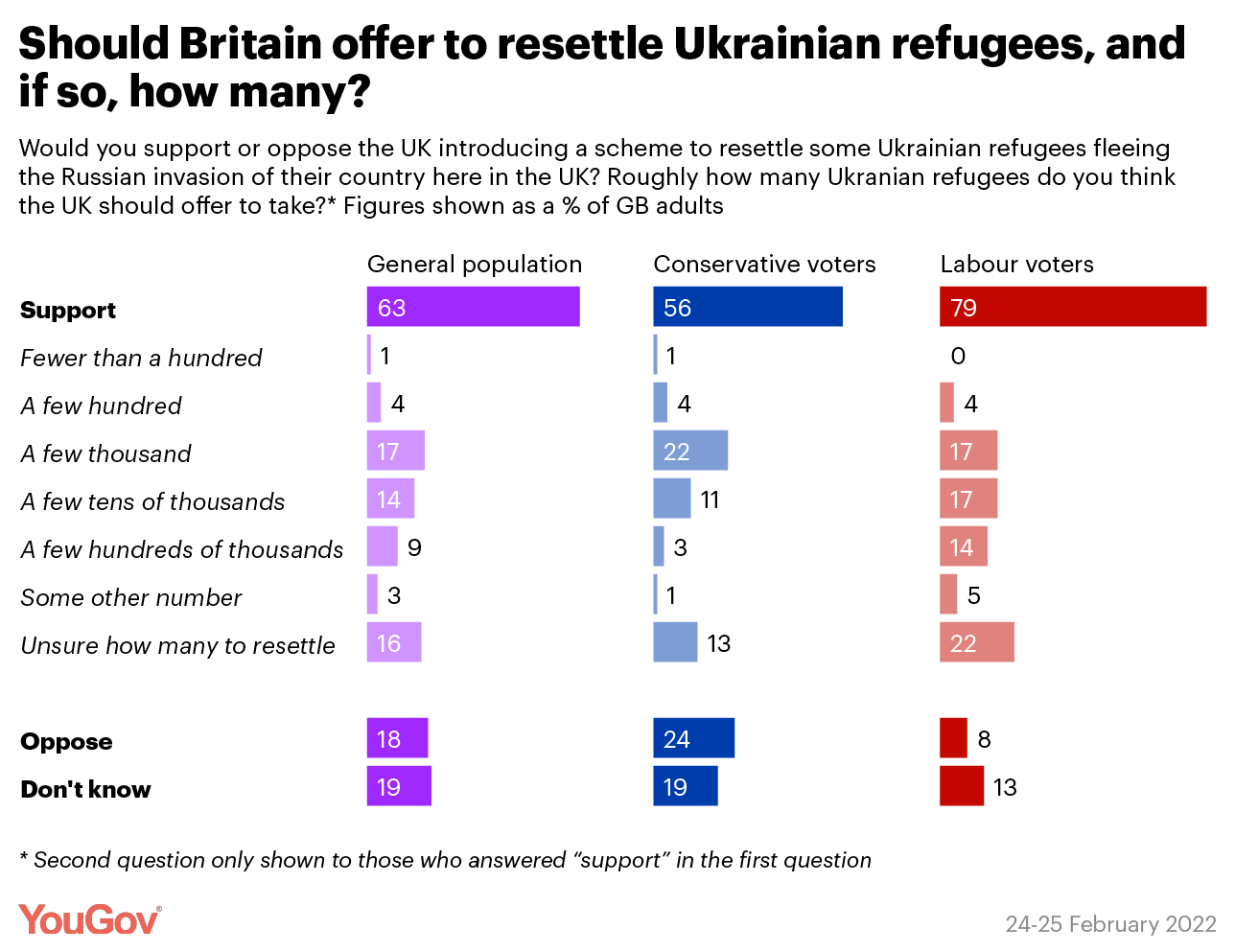
Almost two thirds of British people want the government to resettle Ukrainian refugees, polling has found as ministers refuse to set up a scheme.
Research carried out by YouGov following the Russian invasion on Thursday found that 63 per cent of Britons would support the introduction of a resettlement scheme for those fleeing, and only 18 per cent are opposed.
There is currently no safe and legal route for Ukranians to travel directly from the country to the UK in order to seek asylum, unless they have close British relatives.
Yvette Cooper, Labour's shadow home secretary, said the war was “already having devastating consequences”.
“The UK has a duty to work with our allies to provide humanitarian assistance and support to those fleeing this horrific situation,” she added.
“We must also work with the UN Refugee Agency to make sure contingency plans are ready for further support and sanctuary schemes that will be needed and be prepared to play our part in further international action to support refugees.”
Britain has stopped accepting visa applications from Ukrainians who are stuck in the country, as hundreds of thousands are displaced or flee to neighbouring nations.
On Friday, a Downing Street spokesperson said the government had deployed troops to help the humanitarian response in Poland and was “working incredibly closely with Ukraine’s neighbours to help support them and Ukrainians fleeing the country”.
But they would not be drawn on any further action when asked about safe and legal routes for those wanting to seek asylum in the UK.
When asked by YouGov how many Ukrainian refugees should be accepted, 17 per cent said a “few thousand”, while 14 per cent said tens of thousands and 9 per cent were willing to welcome hundreds of thousands.
The polling showed a majority of both Conservative and Labour voters supported a dedicated resettlement scheme, although Labour voters were more likely to be in support.
Asked whether they believed the UK has a moral obligation to offer asylum to Ukrainian refugees, half of Britons said it does and under a third said it does not.
The Independent understands that the government expects many Ukrainians to stay in Eastern Europe in the short term, or travel to Schengen countries where they can stay visa-free for 90 days, and is not immediately bracing for a rise in small boat crossings.
Ministers are pressing ahead with plans to make arriving in the UK “without permission” a criminal offence punishable up to four years in prison, which would apply equally to asylum seekers of all nationalities.
The measures are contained in the controversial Nationality and Borders Bill, which will be voted on in the House of Lords next week.

The Scottish National Party called for the plans to be scrapped on Friday, and for the creation of safe routes for Ukrainians.
Its shadow home secretary Stuart McDonald said: “While the situation is fast moving, we are clearly going to see a significant movement of refugees from Ukraine into neighbouring EU countries and beyond.
”I urge the UK government to bring forward a serious humanitarian response plan including safe legal routes to the UK. This must include much broader rights for Ukrainian nationals to join both British and Ukrainian family members who are already here in the UK – rather than expecting them to seek asylum in Poland, away from their families.
“And it must also make clear we are willing and prepared to take Ukrainian refugees here.”
Mr McDonald said the Nationality and Borders Bill was an “attack on the Refugee Convention” that must be scrapped before it criminalises Ukrainians trying to reach Britain.
Sonya Sceats, chief executive at Freedom from Torture, said: “Despite pledges of support for people fleeing Ukraine, Boris Johnson preparing to pass a borders bill that will criminalise and deny protection to Ukrainians who make their own way to safety in the UK. “Make no mistake, any parliamentarian who votes in favour of this bill is voting to slam the door in the face of Ukrainian men, women and children in need.”
The bill follows a change to immigration rules meaning that asylum applications from people who have temporarily resided in safe third countries can be declared “inadmissible”.
That means that Ukranians who are forced to travel to countries such as Poland for immediate safety, or in order to obtain UK visas, may later be refused asylum and threatened with deportation.
Official statistics released on Thursday showed the number of asylum claims made in the UK at the highest level in nearly two decades, while the backlog of cases waiting to be determined continues to soar.
Almost three quarters of asylum claims were granted on an initial decision, and almost half of appeals were successful.
A Home Office document said the increase in applications was linked to the easing of Covid travel restrictions “and to a sharp increase in small boat arrivals to the UK”, of which “almost all claim asylum”.
In total, more than 28,5000 people crossed the Channel on small boats in 2021 - triple the number in 2020.
A government spokesperson said: “The government’s priority remains supporting British Nationals and their families who want to leave Ukraine. We are working around the clock to process visa applications.
“Two weeks ago, the home secretary ordered a package of measures, including waiving the application fee for immediate family members of British nationals living in Ukraine who apply under the Family Migration route, and setting up a bespoke helpline to support immediate family members of British nationals who are eligible through the route.
“On Thursday, changes were introduced to support Ukrainian nationals currently in the UK who are now unable to return home.”







